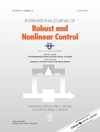
INTERNATIONAL JOURNAL OF ROBUST AND NONLINEAR CONTROL
Scope & Guideline
Elevating Research in Robust and Nonlinear Control
Introduction
Aims and Scopes
- Robust Control Design:
The journal emphasizes methodologies for designing control systems that maintain performance despite uncertainties, disturbances, and model inaccuracies. Techniques such as H-infinity control, sliding mode control, and adaptive control strategies are frequently explored. - Nonlinear System Control:
Research published in the journal often addresses nonlinear dynamics and control strategies, focusing on methods that ensure stability and performance for systems exhibiting nonlinear behaviors, including feedback linearization and Lyapunov-based approaches. - Event-Triggered Control:
A significant area of focus is the development of event-triggered control strategies that optimize communication and computational resources while ensuring system stability, performance, and robustness. - Multi-Agent Systems:
The journal covers control strategies for multi-agent systems, exploring consensus, formation control, and cooperative strategies that allow multiple agents to work together effectively even in the presence of uncertainties. - Model Predictive Control (MPC):
MPC is a core methodology featured in the journal, with emphasis on its application to nonlinear systems, time-varying dynamics, and systems with constraints, including safety-critical applications. - Learning-Based Control:
Emerging themes in the journal include data-driven and reinforcement learning approaches to control, which leverage machine learning techniques to enhance control performance and adaptivity.
Trending and Emerging
- Adaptive and Learning-Based Control Techniques:
There is a rising interest in adaptive control strategies that incorporate machine learning and data-driven methodologies. This trend reflects the need for systems that can learn and adapt to changing environments and uncertainties. - Cyber-Physical Systems and Security Control:
With the increasing interconnectivity of systems, research focusing on the security of cyber-physical systems, including resilience against cyber-attacks and secure consensus protocols, is gaining prominence. - Event-Triggered and Self-Triggered Control Strategies:
The development of event-triggered control strategies, which optimize system performance while reducing communication overhead, is emerging as a key area of research, particularly for networked systems. - Robust Control for Nonlinear Systems:
An increasing number of studies are dedicated to robust control methods specifically designed for nonlinear systems, addressing challenges posed by uncertainties and nonlinear dynamics. - Distributed Control and Consensus Algorithms:
Research into distributed control methods for achieving consensus in multi-agent systems is becoming more prevalent, highlighting the need for effective coordination among interconnected agents. - Finite-Time Control Techniques:
Finite-time control strategies are trending, focusing on ensuring system stability and performance within a predefined time frame, which is crucial for many practical applications.
Declining or Waning
- Traditional PID Control:
As more advanced control techniques gain traction, traditional PID control methods are becoming less frequent in published papers, suggesting a shift towards more sophisticated methods that can handle nonlinearities and uncertainties more effectively. - Basic Linear Control Techniques:
The prevalence of linear control methods has decreased, likely due to the increasing complexity of real-world systems that require nonlinear and robust control strategies. - Static Output Feedback Control:
The focus on static output feedback control has waned, with researchers favoring dynamic and adaptive methods that provide greater flexibility and performance in uncertain environments. - Classical Control Theory Applications:
Research that strictly adheres to classical control theory principles is becoming less common, as many authors explore hybrid approaches that integrate modern computational techniques with classical methods.
Similar Journals
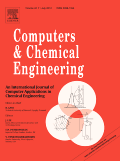
COMPUTERS & CHEMICAL ENGINEERING
Integrating Algorithms and Engineering for a Sustainable FutureComputers & Chemical Engineering, published by Pergamon-Elsevier Science Ltd, stands at the forefront of research at the intersection of chemical engineering and computer science. With an ISSN of 0098-1354 and an E-ISSN of 1873-4375, this esteemed journal has been a vital resource since its inception in 1977, with coverage extending to 2025. It is categorized as Q1 in Chemical Engineering (miscellaneous) and Q2 in Computer Science Applications for 2023, highlighting its significant impact within these fields. Notably, the journal boasts impressive Scopus ranks, placing it in the 84th and 82nd percentiles for Chemical Engineering and Computer Science Applications, respectively. A treasure trove for researchers, professionals, and students alike, Computers & Chemical Engineering focuses on the latest trends and innovations in computational techniques, algorithm development, and their applications to chemical processes, ensuring an avenue for groundbreaking findings and collaborative dialogues. While not an open-access publication, it remains a critical reference point for those seeking robust, peer-reviewed research in the rapidly evolving landscape of chemical engineering and computational methods.
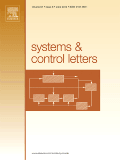
SYSTEMS & CONTROL LETTERS
Shaping Tomorrow’s Technology Through Interdisciplinary ResearchSYSTEMS & CONTROL LETTERS is a prestigious journal published by ELSEVIER, dedicated to the advancement of knowledge in the fields of Systems and Control Engineering. With an ISSN of 0167-6911 and E-ISSN 1872-7956, this journal has become a cornerstone for academics and professionals alike, featured in the top quartile (Q1) categories for Computer Science (miscellaneous), Control and Systems Engineering, Electrical and Electronic Engineering, and Mechanical Engineering as of 2023. The journal encompasses a broad scope of interdisciplinary research and technological advancements, providing a forum for innovative ideas that can shape modern engineering practices. Despite being a subscription-based journal, its impact is underscored by significant Scopus rankings, with a notable placement in the 70th percentile for General Computer Science and consistent recognition across multiple engineering disciplines. With origins dating back to 1981 and converging through to 2024, SYSTEMS & CONTROL LETTERS continues to serve as an essential resource for researchers seeking to publish high-quality research, thereby fostering collaboration and knowledge dissemination within the engineering community.

KYBERNETIKA
Fostering Academic Excellence in Cutting-Edge Disciplines.KYBERNETIKA is a distinguished journal published by KYBERNETIKA in the Czech Republic, dedicated to advancing the fields of Artificial Intelligence, Control and Systems Engineering, Electrical and Electronic Engineering, Information Systems, Software, and Theoretical Computer Science. Since its inception in 1972, it has played a pivotal role in disseminating research findings and innovative theories, providing a platform for academic discourse and groundbreaking studies. The journal has evolved through various periods, including converged years from 1972 to 1989 and 1996 to 2024, showcasing a commitment to ongoing scholarship within the vibrant academic community. Its current standing in multiple categories reflects its importance, being ranked in the third and fourth quartiles in various disciplines, thus appealing to diverse researchers and professionals. While KYBERNETIKA does not offer Open Access, it remains a valuable resource for those interested in the latest developments in its respective fields. The address for submissions and inquiries is POD VODARENSKOU VEZI 4, PRAGUE 8 182 08, CZECH REPUBLIC. Engage with this invaluable repository of knowledge to stay at the forefront of research and innovation.
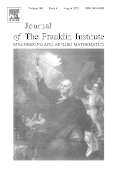
JOURNAL OF THE FRANKLIN INSTITUTE-ENGINEERING AND APPLIED MATHEMATICS
Elevating scholarly discourse in applied mathematics and engineering.JOURNAL OF THE FRANKLIN INSTITUTE-ENGINEERING AND APPLIED MATHEMATICS, published by Pergamon-Elsevier Science Ltd, stands as a premier platform for disseminating cutting-edge research in the fields of applied mathematics, computer networks and communications, control and systems engineering, and signal processing. Established in 1826, this esteemed journal carries a rich heritage of scholarly contributions and continues to be influential, evident in its 2023 recognition as a Q1 journal across multiple research categories. With its commitment to advancing knowledge and innovation, the journal invites researchers, professionals, and students to engage with a diverse array of rigorous studies designed to push the boundaries of engineering and applied mathematics. Although open access options are currently unavailable, the journal maintains a robust publication standard, ensuring that each article undergoes a meticulous peer-review process. By contributing to the JOURNAL OF THE FRANKLIN INSTITUTE, authors can enhance their visibility and impact within the global academic community, solidifying the journal’s role as a cornerstone of research and development.
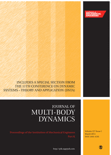
PROCEEDINGS OF THE INSTITUTION OF MECHANICAL ENGINEERS PART K-JOURNAL OF MULTI-BODY DYNAMICS
Unveiling Insights in Multi-Body DynamicsPROCEEDINGS OF THE INSTITUTION OF MECHANICAL ENGINEERS PART K-JOURNAL OF MULTI-BODY DYNAMICS, published by SAGE PUBLICATIONS LTD, stands as a pivotal platform for research dissemination in the fields of Mechanical Engineering and Condensed Matter Physics. With an ISSN of 1464-4193 and an E-ISSN of 2041-3068, this journal covers a broad spectrum of topics related to multi-body dynamics, aiming to facilitate the exchange of knowledge among researchers, professionals, and students alike. With its impressive ranking in the Q2 category for both Mechanical Engineering and Condensed Matter Physics, the journal is recognized for its quality and relevance, placing it within the top 64th and 58th percentiles of its respective fields according to Scopus rankings. Housed in the United Kingdom and accessible via various academic platforms, this journal operates without an open access policy, ensuring rigor in the peer-review process. By bridging theoretical understanding and practical applications, the journal continues to contribute significantly to advancements in multi-body dynamics, making it an essential resource for those engaged in cutting-edge engineering research.

AUTOMATION AND REMOTE CONTROL
Leading the Way in Control Systems ResearchAUTOMATION AND REMOTE CONTROL, published by MAIK Nauka/Interperiodica/Springer, is a distinguished international journal renowned for its contribution to the fields of Control and Systems Engineering and Electrical and Electronic Engineering. With an ISSN of 0005-1179 and an E-ISSN of 1608-3032, this journal has been pivotal since its inception in 1973, offering valuable insights and innovative research findings that span the spectrum of automation technologies and control systems. While categorized in the Q3 quartile in both relevant engineering categories as of 2023, it holds a significant position for researchers aiming to disseminate and access quality research in these areas. The journal emphasizes the importance of integrating advanced automation methods and control strategies, fostering the exchange of knowledge among academics, industry professionals, and students alike. Although it does not provide open access options, the compelling research presented within its pages continues to influence the ongoing development of automation systems worldwide.
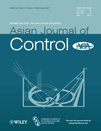
ASIAN JOURNAL OF CONTROL
Shaping the Future of Control Engineering ResearchWelcome to the Asian Journal of Control, an esteemed publication in the fields of Control and Systems Engineering as well as Electrical and Electronic Engineering, published by WILEY. With a continuous convergence from 2000 to 2024, this journal serves as a vital platform for researchers, professionals, and students, offering high-quality peer-reviewed articles that drive innovation and advancement in various control strategies and systems. The journal is renowned for its rigorous academic standards, reflected in its impressive Scopus rankings, with a percentile of 90th in Mathematics (miscellaneous) and 67th in Engineering Control and Systems. Although it does not currently offer open access, the Asian Journal of Control remains an indispensable resource for those looking to push the boundaries of knowledge in engineering disciplines. With its Q2 category ranking in both relevant fields, the journal is poised to influence future research and applications, making it a must-read for those invested in the evolving landscape of control technologies.
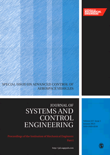
PROCEEDINGS OF THE INSTITUTION OF MECHANICAL ENGINEERS PART I-JOURNAL OF SYSTEMS AND CONTROL ENGINEERING
Exploring New Frontiers in Systems and Mechanical EngineeringPROCEEDINGS OF THE INSTITUTION OF MECHANICAL ENGINEERS PART I - JOURNAL OF SYSTEMS AND CONTROL ENGINEERING is a prestigious journal published by SAGE Publications Ltd, dedicated to the fields of mechanical engineering and systems and control engineering. With an ISSN of 0959-6518 and an E-ISSN of 2041-3041, this journal has established a notable reputation since its conversion in 1991. It holds a solid Q2 ranking in both the Control and Systems Engineering and Mechanical Engineering categories as of 2023, placing it within the top cohort of its field based on Scopus rankings. This journal serves as a vital platform for researchers, professionals, and students, offering high-quality research articles, reviews, and technical notes that contribute to advancements in engineering practices and innovations. By focusing on the intersection of systems theory and mechanical applications, the journal aims to foster interdisciplinary collaboration and knowledge dissemination. As a premier outlet for scholarly work, it continues to drive progress in the engineering realm, ensuring the accessibility and relevance of cutting-edge research.

Systems Science & Control Engineering
Transforming Ideas into Engineering Solutions.Systems Science & Control Engineering, published by Taylor & Francis Ltd, stands out as a premier open-access journal devoted to the advancement of control systems, optimization methodologies, and artificial intelligence applications within engineering. Since its inception in 2013, the journal has garnered a strong reputation evidenced by its impressive categorization in 2023, ranking Q2 in Artificial Intelligence and achieving Q1 status in both Control and Optimization and Control and Systems Engineering. With a Scopus ranking that places it among the top tier of its fields—being positioned 7th in Control and Optimization—this journal serves as an essential resource for researchers, industry professionals, and students who are seeking to publish high-quality research and stay abreast of innovative developments. The journal emphasizes the integration of theoretical frameworks with practical applications, aiming to foster interdisciplinary collaboration and stimulate future research directions in systems science.

Archives of Control Sciences
Exploring New Horizons in Control ApplicationsArchives of Control Sciences is a distinguished open access journal dedicated to the field of control sciences, published by the Polish Academy of Sciences. With its ISSN 2300-2611, the journal has been available to the global research community since 2010, ensuring unrestricted access to groundbreaking findings. The journal seeks to present high-quality research covering various aspects of control theory and its applications, appealing to both researchers and practitioners eager to stay at the forefront of innovation. Although specific metrics like the HIndex and category quartiles are currently not listed, the dedication to open access and the backing of a reputable publisher enhances its visibility and accessibility. Located at PL DEFILAD 1, WARSZAWA 00-901, POLAND, the journal invites submissions that contribute to the advancement of knowledge in control sciences, fostering collaboration and the sharing of insights among professionals in the field.